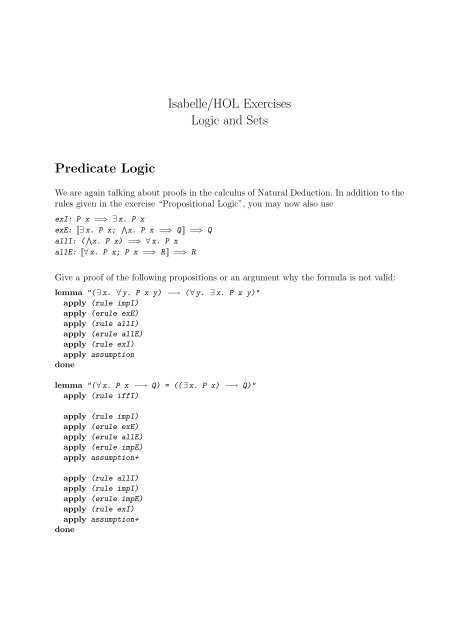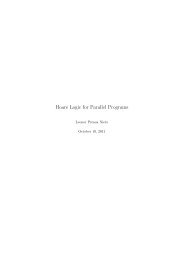Isabelle/HOL Exercises Logic and Sets Predicate Logic
Isabelle/HOL Exercises Logic and Sets Predicate Logic
Isabelle/HOL Exercises Logic and Sets Predicate Logic
Create successful ePaper yourself
Turn your PDF publications into a flip-book with our unique Google optimized e-Paper software.
<strong>Isabelle</strong>/<strong>HOL</strong> <strong>Exercises</strong><strong>Logic</strong> <strong>and</strong> <strong>Sets</strong><strong>Predicate</strong> <strong>Logic</strong>We are again talking about proofs in the calculus of Natural Deduction. In addition to therules given in the exercise “Propositional <strong>Logic</strong>”, you may now also useexI: P x =⇒ ∃ x. P xexE: [∃ x. P x; ∧ x. P x =⇒ Q ] =⇒ QallI: ( ∧ x. P x) =⇒ ∀ x. P xallE: [∀ x. P x; P x =⇒ R ] =⇒ RGive a proof of the following propositions or an argument why the formula is not valid:lemma "(∃ x. ∀ y. P x y) −→ (∀ y. ∃ x. P x y)"apply (rule impI)apply (erule exE)apply (rule allI)apply (erule allE)apply (rule exI)apply assumptiondonelemma "(∀ x. P x −→ Q) = ((∃ x. P x) −→ Q)"apply (rule iffI)apply (rule impI)apply (erule exE)apply (erule allE)apply (erule impE)apply assumption+apply (rule allI)apply (rule impI)apply (erule impE)apply (rule exI)apply assumption+done
lemma "((∀ x. P x) ∧ (∀ x. Q x)) = (∀ x. (P x ∧ Q x))"apply (rule iffI)apply (erule conjE)apply (rule allI)apply (erule allE)+apply (rule conjI)apply assumption+apply (rule conjI)apply (rule allI)apply (erule allE)apply (erule conjE)apply assumptionapply (rule allI)apply (erule allE)apply (erule conjE)apply assumptiondonelemma "((∀ x. P x) ∨ (∀ x. Q x)) = (∀ x. (P x ∨ Q x))"refute.A possible counterexample is: P = even, Q = odd, interpreted over the natural numbers.lemma "((∃ x. P x) ∨ (∃ x. Q x)) = (∃ x. (P x ∨ Q x))"apply (rule iffI)apply (erule disjE)apply (erule exE)apply (rule exI)apply (rule disjI1)apply assumptionapply (erule exE)apply (rule exI)apply (rule disjI2)apply assumptionapply (erule exE)apply (erule disjE)apply (rule disjI1)apply (rule exI)2
apply assumptionapply (rule disjI2)apply (rule exI)apply assumptiondonelemma "(∀ x. ∃ y. P x y) −→ (∃ y. ∀ x. P x y)"refute.For a possible counterexample, let P x y be the statement “y is successor of x”, interpretedover the natural numbers.lemma "(¬ (∀ x. P x)) = (∃ x. ¬ P x)"apply (rule iffI)apply (rule classical)apply (erule notE)apply (rule allI)apply (rule classical)apply (erule notE)apply (rule exI)apply assumptionapply (erule exE)apply (rule notI)apply (erule allE)apply (erule notE)apply assumptiondone3
















